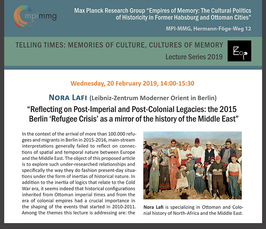"Reflecting on Post-Imperial and Post-Colonial Legacies: the 2015 Berlin ‘Refugee Crisis’ as a mirror of the history of the Middle East"
Telling Times: Memories of Culture, Cultures of Memory - Lecture Series 2019
- Date: Feb 20, 2019
- Time: 02:00 PM - 03:30 PM (Local Time Germany)
- Speaker: Nora Lafi (Leibniz-Zentrum Moderner Orient in Berlin)
- Nora Lafi is specializing in Ottoman and Colo-nial history of North-Africa and the Middle East. She is a Senior Research Fellow at the LeibnizZentrum Moderner Orient in Berlin. She also teaches at the Institute of Islamic Studies of the Freie Universität Berlin. Her publications include Understanding the City Through its Margins (co-ed.) (Abingdon: Routledge, 2018); Urban Violence in the Middle East (co-ed) (London: Berghahn, 2015); Esprit civique et organ-isation citadine dans l’empire ottoman (XVe-XXe s.) (Leiden, Brill, 2019) and “Building and Deconstructing Authenticity in Aleppo”, (in Chr. Bernhardt et al. (ed.), Gebaute Geschichte, Göttingen 2017) as well as “The ‘Arab Spring‘ in Global Perspective“ (in S. Berger and H. Neh-ring (eds.), The History of Social Movements, New-York, Palgrave, 2017).
- Location: MPI-MMG, Hermann-Föge-Weg 12, Göttingen
- Room: Conference Room

For more details please contact cziesielsky(at)mmg.mpg.de.
In the context of the arrival of more than 100.000 refu-gees and migrants in Berlin in 2015-2016, main-stream interpretations generally failed to reflect on connec-tions of spatial and temporal nature between Europe and the Middle East. The object of this proposed article is to explore such under-researched relationships and specifically the way they do fashion present-day situa-tions under the form of inertias of historical nature. In addition to the inertia of logics that relate to the Cold War era, it seems indeed that historical configurations inherited from Ottoman imperial times and from the era of colonial empires had a crucial importance in the shaping of the events that started in 2010-2011. Among the themes this lecture is addressing are: the importance of the imperial Ottoman geography of the region; the relevance of procedures of social mediati-on that were part of the Ottoman imperial governance of diversity; the inertia of the Ottoman definition of élites, identities, communities and individuals; echoes from the times in which European powers challenged the Ottoman sovereignty over the region; the lasting impact on the longue durée of the decisions that were made by European colonial powers during World War I (Sykes-Picot agreement, Balfour declaration…); the importance of colonial categories in the classification of populations; the colonial framework of the definiti-on of the various nationalisms that shaped the region; the colonial origins of the borders between the States of the region; the colonial origins of some instrumen-talizations of religion; the inertia of colonial forms of political violence…